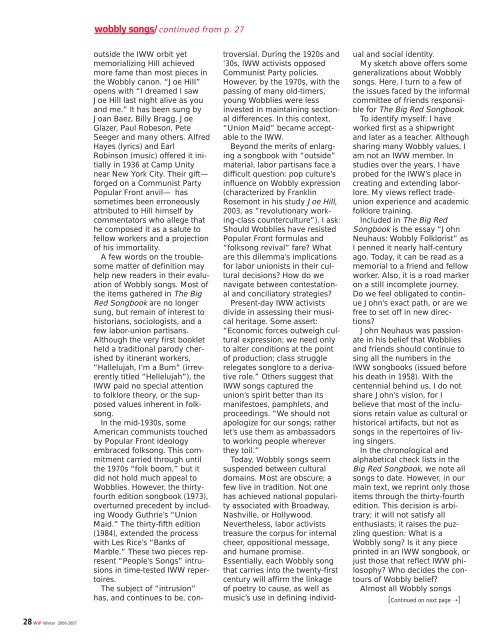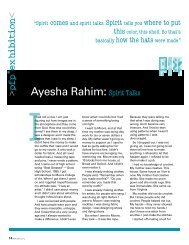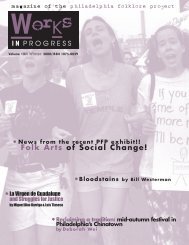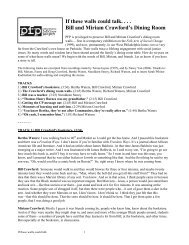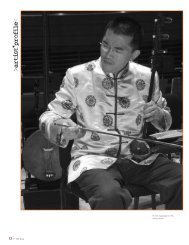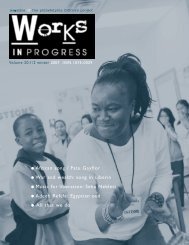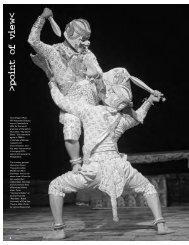The Big Red Songbook: - Philadelphia Folklore Project
The Big Red Songbook: - Philadelphia Folklore Project
The Big Red Songbook: - Philadelphia Folklore Project
You also want an ePaper? Increase the reach of your titles
YUMPU automatically turns print PDFs into web optimized ePapers that Google loves.
wobbly songs/continued from p. 27<br />
outside the IWW orbit yet<br />
memorializing Hill achieved<br />
more fame than most pieces in<br />
the Wobbly canon. “Joe Hill”<br />
opens with “I dreamed I saw<br />
Joe Hill last night alive as you<br />
and me.” It has been sung by<br />
Joan Baez, Billy Bragg, Joe<br />
Glazer, Paul Robeson, Pete<br />
Seeger and many others. Alfred<br />
Hayes (lyrics) and Earl<br />
Robinson (music) offered it initially<br />
in 1936 at Camp Unity<br />
near New York City. <strong>The</strong>ir gift—<br />
forged on a Communist Party<br />
Popular Front anvil— has<br />
sometimes been erroneously<br />
attributed to Hill himself by<br />
commentators who allege that<br />
he composed it as a salute to<br />
fellow workers and a projection<br />
of his immortality.<br />
A few words on the troublesome<br />
matter of definition may<br />
help new readers in their evaluation<br />
of Wobbly songs. Most of<br />
the items gathered in <strong>The</strong> <strong>Big</strong><br />
<strong>Red</strong> <strong>Songbook</strong> are no longer<br />
sung, but remain of interest to<br />
historians, sociologists, and a<br />
few labor-union partisans.<br />
Although the very first booklet<br />
held a traditional parody cherished<br />
by itinerant workers,<br />
“Hallelujah, I’m a Bum” (irreverently<br />
titled “Hellelujah”), the<br />
IWW paid no special attention<br />
to folklore theory, or the supposed<br />
values inherent in folksong.<br />
In the mid-1930s, some<br />
American communists touched<br />
by Popular Front ideology<br />
embraced folksong. This commitment<br />
carried through until<br />
the 1970s “folk boom,” but it<br />
did not hold much appeal to<br />
Wobblies. However, the thirtyfourth<br />
edition songbook (1973),<br />
overturned precedent by including<br />
Woody Guthrie’s “Union<br />
Maid.” <strong>The</strong> thirty-fifth edition<br />
(1984), extended the process<br />
with Les Rice’s “Banks of<br />
Marble.” <strong>The</strong>se two pieces represent<br />
“People’s Songs” intrusions<br />
in time-tested IWW repertoires.<br />
<strong>The</strong> subject of “intrusion”<br />
has, and continues to be, controversial.<br />
During the 1920s and<br />
‘30s, IWW activists opposed<br />
Communist Party policies.<br />
However, by the 1970s, with the<br />
passing of many old-timers,<br />
young Wobblies were less<br />
invested in maintaining sectional<br />
differences. In this context,<br />
“Union Maid” became acceptable<br />
to the IWW.<br />
Beyond the merits of enlarging<br />
a songbook with “outside”<br />
material, labor partisans face a<br />
difficult question: pop culture’s<br />
influence on Wobbly expression<br />
(characterized by Franklin<br />
Rosemont in his study Joe Hill,<br />
2003, as “revolutionary working-class<br />
counterculture”). I ask:<br />
Should Wobblies have resisted<br />
Popular Front formulas and<br />
“folksong revival” fare? What<br />
are this dilemma’s implications<br />
for labor unionists in their cultural<br />
decisions? How do we<br />
navigate between contestational<br />
and conciliatory strategies?<br />
Present-day IWW activists<br />
divide in assessing their musical<br />
heritage. Some assert:<br />
“Economic forces outweigh cultural<br />
expression; we need only<br />
to alter conditions at the point<br />
of production; class struggle<br />
relegates songlore to a derivative<br />
role.” Others suggest that<br />
IWW songs captured the<br />
union’s spirit better than its<br />
manifestoes, pamphlets, and<br />
proceedings. “We should not<br />
apologize for our songs; rather<br />
let’s use them as ambassadors<br />
to working people wherever<br />
they toil.”<br />
Today, Wobbly songs seem<br />
suspended between cultural<br />
domains. Most are obscure; a<br />
few live in tradition. Not one<br />
has achieved national popularity<br />
associated with Broadway,<br />
Nashville, or Hollywood.<br />
Nevertheless, labor activists<br />
treasure the corpus for internal<br />
cheer, oppositional message,<br />
and humane promise.<br />
Essentially, each Wobbly song<br />
that carries into the twenty-first<br />
century will affirm the linkage<br />
of poetry to cause, as well as<br />
music’s use in defining individual<br />
and social identity.<br />
My sketch above offers some<br />
generalizations about Wobbly<br />
songs. Here, I turn to a few of<br />
the issues faced by the informal<br />
committee of friends responsible<br />
for <strong>The</strong> <strong>Big</strong> <strong>Red</strong> <strong>Songbook</strong>.<br />
To identify myself: I have<br />
worked first as a shipwright<br />
and later as a teacher. Although<br />
sharing many Wobbly values, I<br />
am not an IWW member. In<br />
studies over the years, I have<br />
probed for the IWW’s place in<br />
creating and extending laborlore.<br />
My views reflect tradeunion<br />
experience and academic<br />
folklore training.<br />
Included in <strong>The</strong> <strong>Big</strong> <strong>Red</strong><br />
<strong>Songbook</strong> is the essay “John<br />
Neuhaus: Wobbly Folklorist” as<br />
I penned it nearly half-century<br />
ago. Today, it can be read as a<br />
memorial to a friend and fellow<br />
worker. Also, it is a road marker<br />
on a still incomplete journey.<br />
Do we feel obligated to continue<br />
John’s exact path, or are we<br />
free to set off in new directions?<br />
John Neuhaus was passionate<br />
in his belief that Wobblies<br />
and friends should continue to<br />
sing all the numbers in the<br />
IWW songbooks (issued before<br />
his death in 1958). With the<br />
centennial behind us, I do not<br />
share John’s vision, for I<br />
believe that most of the inclusions<br />
retain value as cultural or<br />
historical artifacts, but not as<br />
songs in the repertoires of living<br />
singers.<br />
In the chronological and<br />
alphabetical check lists in the<br />
<strong>Big</strong> <strong>Red</strong> <strong>Songbook</strong>, we note all<br />
songs to date. However, in our<br />
main text, we reprint only those<br />
items through the thirty-fourth<br />
edition. This decision is arbitrary;<br />
it will not satisfy all<br />
enthusiasts; it raises the puzzling<br />
question: What is a<br />
Wobbly song? Is it any piece<br />
printed in an IWW songbook, or<br />
just those that reflect IWW philosophy?<br />
Who decides the contours<br />
of Wobbly belief?<br />
Almost all Wobbly songs<br />
[Continued on naxt page ➝]<br />
28 WIP Winter 2006-2007


